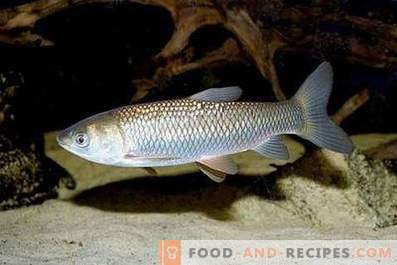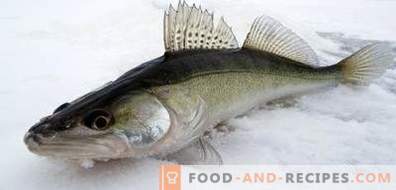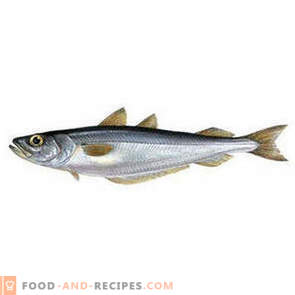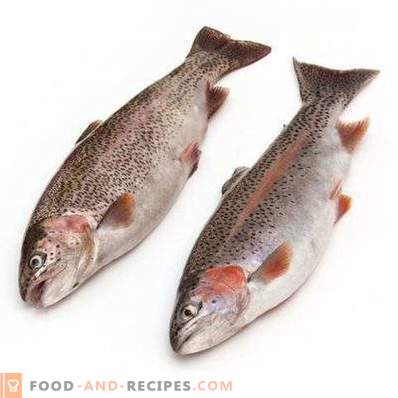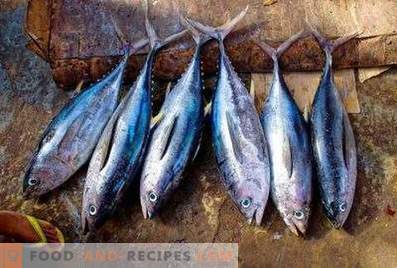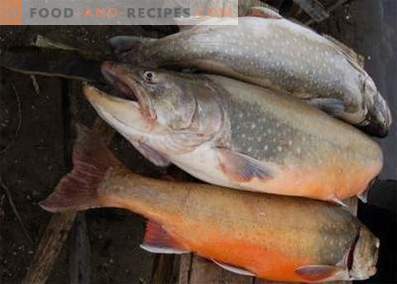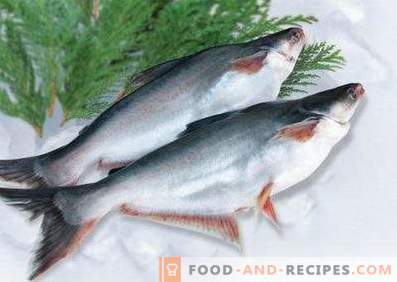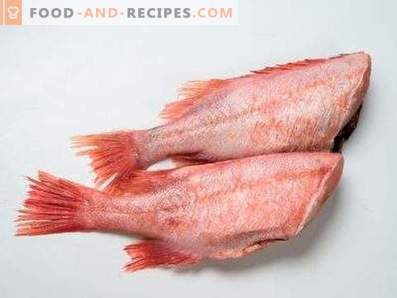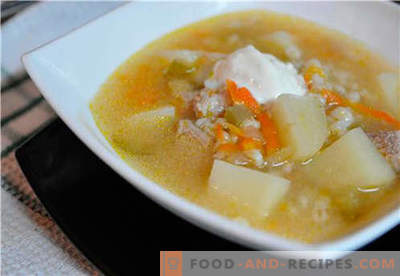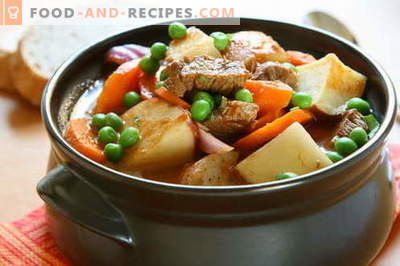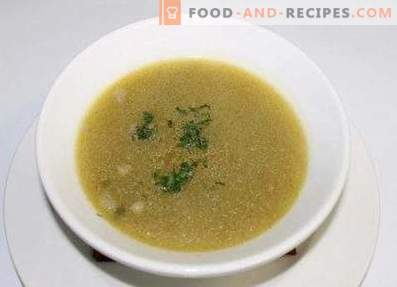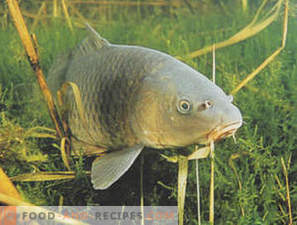
The carp is a large fish of the carp family living in freshwater bodies of Asia, Europe and North America, in the Black, Caspian and Azov seas. Representatives of this species have a slightly elongated thick body covered with large scales, a large head with a narrow retractable mouth. On a well-developed upper lip of the fish there are two pairs of short mustaches. The backs of carps are dark gray or dirty brown. The fins of the fish are gray, reddish or light violet, the sides are golden brown, the belly is pale yellow.
In favorable conditions, carp live to be 33-35 years old. During this time, it grows to 75-90 cm in length and gains weight up to 18-19 kg. Occasionally, in nurseries and wild water bodies, larger specimens are found, reaching 120 cm in length and having a weight of up to 47 kg.
For sale carp comes in frozen or chilled. In specialized fish shops and large shopping centers this fish is sold alive. Gentle sweet carp meat is boiled, fried, baked, stewed and marinated. In addition, it is used for cooking soup, canned food, snacks and main dishes.
How to choose a carp?
When choosing a carp, you must ensure that the fish have:
- light, unobtrusive smell of river water and algae;
- elastic body that is not deformed when pressed with a finger, not covered with blood or a thick layer of unpleasantly smelling mucus;
- moderately moist, unstitched gill petals of pink or red color;
- transparent, uncomplicated eyes.
When buying frozen carcasses, make sure that there are no pink crystals of ice and snow in the package.
Nutritional value of carp
100 g of fish contains:
- 15, 879 g of proteins;
- 5, 284 g of fat;
- 54, 687 mg of cholesterol;
- 0, 054 g of omega-3;
- 1, 277 g of ash;
- 0, 284 g omega-6;
- 77, 343 g of water.
Vitamins in carp
Carp meat is a real storehouse of vitamins. A serving of this fish weighing 100 g contains:
- retinol equivalent (A) - 19, 804 mcg;
- cobalamin (B12) - 1, 447 µg;
- pantothenic acid (B5) - 0, 186 mg;
- ascorbic acid (C) - 1, 489 mg;
- thiamine (B1) - 0, 137 mg;
- calciferol (D) - 24, 687 μg;
- pyridoxine (B6) - 0, 168 mg;
- tocopherol equivalent (E) - 0, 491 mg;
- Riboflavin (B2) - 0, 053 mg;
- phylloquinone (K) - 0.097 μg;
- folates (B9) - 9, 288 mkg;
- Niacin equivalent (PP) - 5, 492 mg;
- choline (B4) - 64, 836 mg.
Carp calories
Calorie carp depends on the characteristics of its culinary processing. So, in a portion of this fish weighing 100 g contains:
- raw - 111, 704 kcal;
- baked - 123, 908 kcal;
- boiled - 101, 484 kcal;
- fried - 197, 109 kcal;
- pickled - 137, 806 kcal;
- stew - 109, 683 kcal;
- canned - 141, 672 kcal.
The energy value of carp soup - 43, 271 kcal.
Useful items in carp
Trace elements in 100 g of carp:
- 0, 784 mg of Fe (iron);
- 3, 982 μg Mo (molybdenum);
- 4, 817 mcg I (iodine);
- 6, 871 µg Ni (nickel);
- 34, 913 µg Co (cobalt);
- 54, 668 mcg Cr (chromium);
- 12, 576 µg Se (selenium);
- 0, 149 mg Mn (manganese);
- 24, 877 μg F (fluorine);
- 2, 076 mg Zn (zinc);
- 129, 844 mcg Cu (copper).
Macroelements in 100 g of carp:
- 266, 106 mg K (potassium);
- 179, 805 mg S (sulfur);
- 34, 782 mg Ca (calcium);
- 209, 336 mg Ph (phosphorus);
- 24, 774 mg of Mg (magnesium);
- 54, 893 mg Cl (chlorine);
- 54, 901 mg of Na (sodium).
Useful properties of carp
- Carp meat contains up to 16% of fast-digestible proteins with a perfectly balanced composition of amino acids. Because of this, it can be included in the diet menu as a source of protein.
- Carp is a natural source of cobalamin, iron, and other useful nutrients that normalize the functioning of the blood system. With regular consumption of dishes prepared on its basis, the risk of developing anemia and other dangerous blood diseases is reduced.
- Magnesium, potassium and other nutrients contained in carp fillets strengthen blood vessels and heart muscle, thereby preventing the development of cardiac malfunctions.
- Regular consumption of this fish contributes to the accelerated elimination of poisons, slags and excess harmful cholesterol from the body.
- Iodine that enters the digestive tract along with carp meat stimulates the production of thyroid hormones and prevents the development of thyroid diseases. This useful macroelement contributes to the mental development of children and helps the body recover faster after increased intellectual loads.
- Calcium, phosphorus and other useful macronutrients with which carp is rich strengthen bone tissues, accelerate their coalescence after fractures and other injuries, help prevent the development of osteochondrosis.
- B vitamins of group B, which are present in sufficient quantity in carp fillets, are also beneficial for the body. Compounds belonging to this class, accelerate metabolic processes, normalize the work of the nervous system.
- Antioxidants in carp help the body protect cells from the damaging effects of free radicals. Regular consumption of this fish fillet reduces the likelihood of developing cancer, slowing the aging process.
- Nutrients entering the body through eating carp help to normalize the digestive tract, activate the synthesis of digestive enzymes.
- Regular consumption of this fish helps to normalize blood sugar levels. People with diabetes, it is advisable to include it in the diet once every two or three days.
- Carp is rich in substances that strengthen the immune system and help the body recover from debilitating diseases, prolonged exposure to stressful situations, and serious physical exertion. With regular consumption of this fish reduces the risk of developing colds, increases the body's resistance to bacterial, viral infections.
- Vitamin E and other useful nutrients with which carp fillets are rich have a positive effect on the condition of the skin, hair, nail plates and mucous membranes.
Contraindications and harm to carp
- Carp is contraindicated for people who are allergic to any fish and seafood.
- Carps grown in nurseries feed on artificial feed, which may contain antibacterial drugs, dyes and growth accelerators. These substances can have a negative impact on the functioning of the internal organs of a person.
- Carp meat contains many small bones that can injure the mucous membrane of the larynx and esophagus.
- Carp is one of those fish that are most susceptible to infestation by parasites. Therefore, dishes that contain its meat must be subjected to prolonged heat treatment (bake for at least 50 minutes, cook and fry for at least half an hour).

